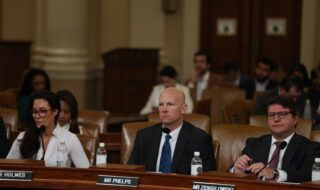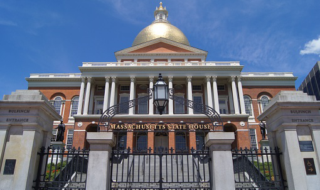February 19, 2024 Last Edit: January 13, 2025
From your small-business-advocacy team in Sacramento
Happy Presidents’ Day. Welcome to the February 19-23 edition of the NFIB California Main Street Minute from your small-business-advocacy team in Sacramento.
Not Taking ‘No’ for an Answer
- The deadline to introduce bills passed Friday, February 16, and making it ashore were two horrendously bad measures some thought safely washed out to sea not too long ago.
- Assembly Bill 2200, “the California Guaranteed Health Care for All Act, would create the California Guaranteed Health Care for All program, or CalCare, to provide comprehensive universal single-payer health care coverage and a health care cost control system for the benefit of all residents of the state.”
- AB 2200 is Assemblymember Ash Kalra’s second attempt in three years to establish a single-payer system for California. His first stab at it sunk in 2022, thanks in part to the extensive lobbying efforts by NFIB members, Small Business Advocacy Helps Stop California Single-Payer Healthcare Legislation.
- Looks like NFIB members will have to suit up one more time.
Also making a return engagement …
- It was only a few months ago, at the close of the 2023 half of this current legislative session, that Gov. Gavin Newsom did the heroic thing by vetoing Senate Bill 799, which would have allowed striking workers to collect unemployment benefits.
- Lorena Gonzalez, the all-powerful head of the California Labor Federation, is not taking ‘no’ for an answer.
- “Newsom has the ability to veto a bill, but we have the ability to bring it back,” she told Politico California. “And ultimately, we will continue to do that and we will continue to do it until this governor or a future one signs it.”
- The new measure bringing it back is Senate Bill 1116 with the same author, Sen. Anthony Portantino, who is also currently running for Congress.
- Click here for the latest bill list on the legislation NFIB has engaged in during the 2023-2024 session.
More bad legislation …
- In a news release commenting on NFIB’s latest Small Business Economic Trends report, NFIB California State Director John Kabateck pointed out some of the other bad-for-small-business bills this Legislature continues to mint.
- “Nice to see the S&P 500, DJIA, and the Nasdaq Composite Indexes all doing well, but the one that matters the most – and should to every policymaker in America – is not, and that needs to change if small business, the engine of every economy on earth, is to ever rev again. A lot of factors contributing to Main Street’s malaise are at work, but California, more than any other state, adds its homemade handicaps such as this year’s five migraine-inducing compliance headaches and legislative proposals attacking independent contractors (SB 988), limiting an employer’s free speech with his employees (SB 399), and allowing paid sick days to accrue like they were airline mileage points (AB 1359). While a predicted $50 billion state budget deficit for years to come has managed to tame this Legislature’s desire to spend money a bit, it’s come at the cost of tickling its fetish for more regulations.”
Now, for Something Positive
- Assembly Speaker Robert Rivas is refreshingly proving to be more steak than sizzle with his promise to do something about retail theft.
- Last Thursday (February 15), Rivas joined Assemblymembers Rick Zbur, chairman of the Assembly Select Committee on Retail Theft (which Rivas created) and Kevin McCarty, chairman of the Assembly Public Safety Committee, to unveil their California Retail Theft Reduction Act (Assembly Bill 2943).
- “Focusing on professional retail thieves,” reported CalMatters, “Zbur said the measure would create a new crime with a penalty as long as three years behind bars for the possession of stolen property with the intent to sell. Because ‘intent to sell’ can be difficult to prove in court, evidence can include repeated offenses or possessing an amount of goods that is ‘inconsistent with personal use.’”
- Will it work? The bill doesn’t touch the $950 threshold for misdemeanor shoplifting, which many, including a growing number of Democratic legislators and mayors, attribute as one of the bigger problems contributing to rampant retail theft.
- An initiative muscling its way to the November ballot would handle the $950 problem this way: “The value of property stolen in multiple thefts will be permitted to be added together so that in appropriate cases an offender may be charged with felony theft instead of petty theft. This provision addresses the problem of offenders who commit a series of thefts in which the property stolen during each theft has a value under the $950 felony theft threshold.”
- That initiative, the Homelessness, Drug Addiction, and Theft Reduction Act, received the backing of influential Assemblyman James Ramos last Thursday (February 15). Ramos is no stranger to the cause, having tried last year to pass legislation addressing the problem.
- “I am proud to lend my support to this public safety initiative that would make changes to Prop 47 which would address serious spikes to drug and theft crimes since the pandemic. Local law enforcement and my constituents are saying enough is enough to enough. They want the state to address the increases we’re seeing in homeless due to increased hard drug use, opioid-related overdoses and escalating numbers of smash and grab and retail theft crimes,” Ramos said in a news release.
Have You Voted Yet?
- Check out this story from NFIB California about the easy ways you can cast your ballot. A list of the state legislative candidates endorsed by NFIB CA PAC is also in the story.
Calendar
- February 20, last day to register for the March Primary Election
- March 5, Primary Election Day
- May 24 deadline for bills to pass their house of origin (Assembly, Senate)
- June 27 deadline for ballot measure to qualify for November
- August 31 deadline for bills to have passed Legislature and sent to governor
- September 30 deadline for governor to sign bills into law
- November 5, General Election Day
National Highlights from NFIB Legislative Program Manager Caitlin Lanzara’s weekly report
- On February 14, NFIB submitted a Statement for the Record to the U.S. House Committee on Financial Services concerning a hearing titled, “Oversight of the Financial Crimes Enforcement Network (FinCEN) and the Office of Terrorism and Financial Intelligence (TFI).”
- Chairman Patrick McHenry (NC-10) cited NFIB research on beneficial ownership information (BOI) reporting requirements in his opening remarks: “Every single small business in America will be forced to comply with this regime. Yet, 90% don’t know they have new reporting responsibilities, according to a recent survey by the NFIB.”
- Failure to file completed and updated reports with the Financial Crimes Enforcement Network (FinCEN) could result in civil penalties of up to $10,000 and criminal penalties of up to 2 years in prison.
- This burdensome regulation smothers the smallest businesses in America with more than $73 billion in compliance costs and it only applies to small businesses with 20 or fewer employees and $5 million or less in annual revenue.
This Main Street Minute can also be read on the NFIB California webpage here. Next Main Street Minute February 26.
NFIB is a member-driven organization advocating on behalf of small and independent businesses nationwide.
Related Articles














